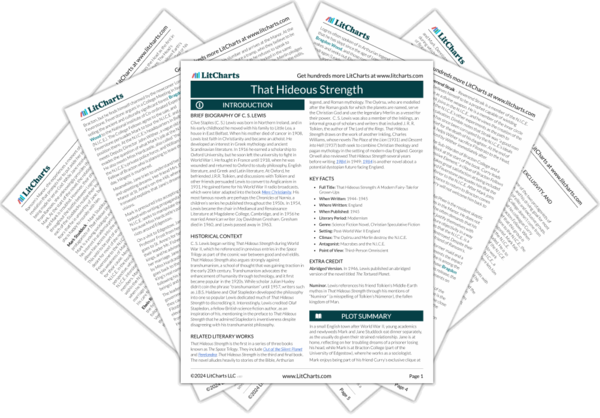Bragdon Wood symbolizes the interconnectedness of nature and tradition. It is a place steeped in tradition and lore: the mythical wizard Merlin sleeps beneath the Wood, and characters throughout the novel note that Merlin himself is a symbol of the time when England was the noble kingdom of Logres. The Wood shelters the last vestiges of Logres, and people recognize and respond to its significance by designating the ancient well in the Wood “Merlin’s Well” and establishing ceremonial traditions around drinking from the well.
The fact that the story’s symbol of the ancient world is a forest draws attention to the villainous N.I.C.E.’s plan to separate humanity from organic life. When the N.I.C.E. purchase the Wood, they destroy much of its natural landscape. This highlights the idea that the N.I.C.E.’s aim of elevating human beings beyond nature cannot be achieved without the violent destruction not just of the natural world itself, but also of humanity’s traditional connections to nature (which the novel portrays as being universally positive and fulfilling). The destruction of Bragdon Wood suggests that industrialization and technological advancement is simply progress for the sake of progress, and that it serves no purpose except to sever the tangible ties people have to their traditions.
Bragdon Wood Quotes in That Hideous Strength
Before [Curry] sat down, nearly everyone in the room desired strongly to make the outer world understand that Bragdon Wood was the private property of Bracton College and that the outer world had better mind its own business. […] Then came a new voice from quite a different part of the Soler. Lord Feverstone had risen. […] A good many Fellows––Studdock was not one of them––imagined they were watching a revolt on Feverstone’s part against Curry and his gang and became intensely interested. […] gradually, one by one, the “outsiders” and “obstructionists,” the men not included in the Progressive Element, began coming into the debate.

Unlock explanations and citation info for this and every other That Hideous Strength quote.
Plus so much more...
Get LitCharts A+









